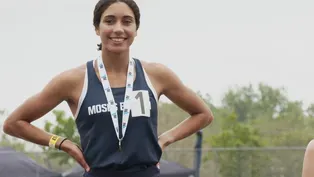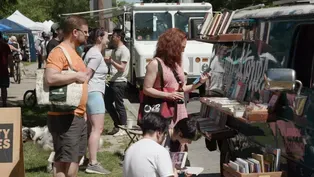
Saving History
Clip: Season 4 Episode 26 | 9m 43sVideo has Closed Captions
A local historian has spent decades documenting what brought Latinos to Rhode Island.
Marta Martinez has interviewed about 110 Latinos for the Latino Oral History Project of Rhode Island. Martinez says learning what brought the state’s early Latino pioneers to Rhode Island helps to understand how communities evolve.
Problems with Closed Captions? Closed Captioning Feedback
Problems with Closed Captions? Closed Captioning Feedback
Rhode Island PBS Weekly is a local public television program presented by Rhode Island PBS

Saving History
Clip: Season 4 Episode 26 | 9m 43sVideo has Closed Captions
Marta Martinez has interviewed about 110 Latinos for the Latino Oral History Project of Rhode Island. Martinez says learning what brought the state’s early Latino pioneers to Rhode Island helps to understand how communities evolve.
Problems with Closed Captions? Closed Captioning Feedback
How to Watch Rhode Island PBS Weekly
Rhode Island PBS Weekly is available to stream on pbs.org and the free PBS App, available on iPhone, Apple TV, Android TV, Android smartphones, Amazon Fire TV, Amazon Fire Tablet, Roku, Samsung Smart TV, and Vizio.
Providing Support for PBS.org
Learn Moreabout PBS online sponsorshipIt's one of Rhode Island's most well-known neighborhoods - Have a good one.
- [Michelle] Broad Street in Providence, also known as La Broa, is packed with Dominican restaurants.
- This is Mi Sueno, the owner is Dominican, and he likes to welcome everybody, which is why you see all the flags.
- [Michelle] And all kinds of Dominican-owned businesses.
- This is a bodega.
This is one of the many bodegas.
- [Michelle] Marta Martinez loves to give people tours of La Broa.
- My first entry to the Rhode Island Latino community was here and it was like my senses exploded.
It's like I'm home.
- [Michelle] She's been studying the history of Latinos in Rhode Island for more than 30 years.
- This is Juan Paolo Duarte, and he is one of the founders of the Dominican Republic.
- [Michelle] To understand why communities like La Broa are shaped the way they are, Martinez says you have to study the past and learn about a woman named Josefina Rosario, better known as Dona Fefa.
Who was Dona Fefa?
- Dona Fefa was, if I can just define her in one sentence, she's the mother of the Latino community.
She and her husband Tony moved to Rhode Island.
They opened the first bodega.
She was looking for her food and she wanted platanos and (indistinct) she couldn't find it.
So she says "Well, I'm gonna open a bodega.
And she did.
- [Michelle] Fefa's market opened on Broad Street in the early 1960s.
It went on to become a welcome site for Dominicans who left an impoverished country.
Martinez says Dona Fefa offered new immigrants more than a taste of their homeland.
- She would first help them find apartments or housing or jobs or schools for their kids, driver's license.
She was like an informal social worker.
And the bodega became the place where you went to ask Fefa, I need a job, my kids need aa place to live.
We're going to hear from Dona Fefa.
It's my very first interview.
- [Michelle] Martinez sat down with Fefa in 1991 to document her story.
Listening back to the crackled audio, Martinez recalls asking Fefa about her early memories of life in Rhode Island.
- She's describing the house, their first house where they kept all the Dominicans.
- Fefa later died in 2018.
She's one of about 110 Latinos in Rhode Island whom Martinez has interviewed for the Latino Oral History Project of Rhode Island.
What sparked your interest in collecting the history of Latinos in Rhode Island?
- Yeah, so I didn't set out to do just that.
I went to school here and I left, and then I came back.
I was hired to work for a Latino organization, a Hispanic organization at the time.
And I thought, well, if I'm gonna be working representing this group, I wanna know who they are.
And so I went out to look for them if I may put it that way.
- [Michelle] Martinez found a welcoming community of Latinos on Broad Street and was eager to see what else she could learn.
- Outside of walking Broad Street, I went to the library and looked in newspapers and tried to find information and there was nothing.
The only thing I could find were newspaper articles that were negative, Latinos arrested, Latinos in poverty, and it just didn't seem right to me.
And I just felt that it was important that people got to see a positive side of the Latino community.
- [Michelle] That positive side includes telling people about what Martinez describes as the state's Latino pioneers.
- This is Roberto Gonzalez.
He did a lot.
- A time when the Latino community was just starting to come to Rhode Island.
- [Michelle] In 2004, Gonzalez, who's from Puerto Rico, was sworn into the Providence Housing Court, making him the first Latino judge in the state.
Martinez asked him about it during an interview she recorded back in 2015.
- I was used to going in the courtroom and being asked if I was the interpreter.
So here's an opportunity now to be addressed as Your Honor.
- [Michelle] Martinez says another Latino pioneer in the Ocean State is Miriam Salabert Gorriaran.
- There were all kinds of rumors that children were going to be taken from their homes and they would be put out in the fields to cut cane.
- She left Cuba with her siblings in 1961 as part of Operation Peter Pan, a program that helped 14,000 children come to the United States to escape Fidel Castro's Communist regime.
In the three decades you've been doing this, what has most surprised you about what you've learned from these interviews?
- How similar their stories are and the hidden stories behind the individuals.
Most people think, well, I just did what I did, I'm nobody special, but I remind them, you know, what you did was huge.
I'm gonna do the interview in two languages.
- [Michelle] On this day, Martinez sat down with Socolo Gano and her daughter Sesi.
They came to Rhode Island from Columbia in 1969.
Sesi's father had moved there the year before for work.
(family speaking foreign language) Sesi became emotional remembering what those early years were like as immigrants.
(family speaking foreign language) (family speaking foreign language) Like the Gano family, Martinez says there are countless stories of sacrifices.
These are the stories she wants students to learn about.
Too often she says Latino history is only briefly mentioned in history books.
- I just felt that that wasn't right, that people needed to know more about the Latino children and the young people needed to know about the Latino history here and who were the important people.
So she does it until it becomes transparent.
- [Michelle] Martinez wants to not only make sure that these stories are recorded in history.
- [Marta] So we're waiting for it to just melt, and it's nice and hot so it will, it's just like butter.
- [Michelle] But also that traditions continue to get passed down to the next generation.
- Okay, everybody, if you can all come up to her.
- [Michelle] She recently hosted what's known as a tamalada.
- [Marta] It's like, yeah, like wrapping a gift.
- [Michelle] People were invited to the Rhode Island Latino Arts office in Central Falls to learn how to make a type of Peruvian tamale.
- [Marta] Everybody have two so far?
- Martinez is committed to preserving cultural identity through food.
(Marta speaking foreign language) And you're passionate about not only collecting the history of Latinos in Rhode Island, but also the customs, making sure that that does not get lost.
- Some people told me that I should call myself a cultural preservationist because that's basically what it is when you retain your language, when you retain the dance of a Bomba, when you play flamenco guitar, all of those things, it's a way of preserving your culture.
So the bodega was this whole area here.
There were buildings.
- [Michelle] Martinez showed me the site where Fefa's market once stood.
The building was demolished decades ago.
- We're heading towards this temporary piece of art.
- [Michelle] Martinez hopes that an art piece can be erected at the site of the former bodega.
- [Marta] And this is a image of Dona Fefa that was taken more recently.
- For now, a mural of Dona Fefa was painted over this utility box, honoring a woman who Martinez says paved the way for future Latinos.
If not for the work that you've been doing for so many decades, how would people know about the influence that Latinos have had in Rhode Island?
- I don't know, that's exactly, I do sit back and think about that and I'm very conscious because aside from the oral histories, I'm trying to create the narrative and I spend a lot of time in our archives and libraries because I think there's gotta be stuff here, and I do locate it but it's always buried, and my job I feel is to bring it to the surface and to share it.
(gentle music)
Video has Closed Captions
Clip: S4 Ep26 | 11m 6s | A local teen may be the fastest woman in the world. Sophia Gorriaran is on the fast track. (11m 6s)
Video has Closed Captions
Clip: S4 Ep26 | 3m 54s | Two booksellers take their show on the road. (3m 54s)
Providing Support for PBS.org
Learn Moreabout PBS online sponsorshipSupport for PBS provided by:
Rhode Island PBS Weekly is a local public television program presented by Rhode Island PBS












